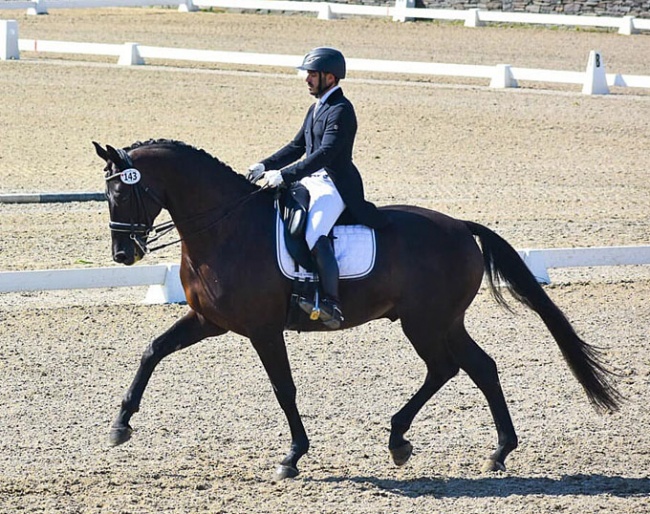
Guest columnist of this week is American Grand Prix rider Vincent Flores. He is a USDF Gold medalist who started his riding career in France. In 2012 he moved to the U.S.A. and briefly competed at international small tour level in 2016. He is now based in the Massachusetts, where he runs a training business.
Debunking the Idea that Some Riders are Born with Talent and Some are Not
I’d like to debunk the idea that people are born with talent and some are not. In our sport so many times I hear people say "I am not naturally talented for dressage", or "this rider succeeds because s/he is so talented". Talent means to have a natural ability for something or some sort of gifted skills or aptitude for a particular task.
I personally don't think we do, I don't think I am more or less talented than any other rider, and I don't think any of my student is less talented than I.
Hiding behind a self-established belief than we were not born with the same ability than someone else for riding is only a self-limiting belief, and does not reflect the reality.
In my opinion, people we look up to, or that we would define as talented exhibit at the very least these four traits:
1) They are disciplined, hardworking and therefore offer consistency to their horse.
Do you really think Charlotte Dujardin and Valegro would have achieved what they did if she would have given up on riding the days when it is too rainy, or too cold, or when she felt tired? Do you really think she would have achieved what she did if she had changed trainer each time she faced a training obstacle or each time she failed at a show?
Dressage is not a sport of instant gratification, it is a long term process in which we need to follow a training system and stick to it, unless the system proves not to be successful. If your trainer hasn't been consistently successful bringing horses up the levels, perhaps you should consider a different role model for your own journey to success. Once you have found it, you need to believe in it and stick to it, progress is not always linear, and will involve multiple failures along the way.
Yet, so many people give up after facing one failure or one obstacle and change strategy.
2) They are fair to their horse
I witness so many horses treated poorly even by horse professionals, ranging from horses ridden 2 to 3 hours in row, young horses being pushed too hard too fast, or horses being worked while being lame or in pain.
If we want to be successful in this sport we need to love our horses and treat them with respect, and not blame them for our incapacity to communicate the right cue to them. Loving our horses also means that we have to establish boundaries with them, the same way you would do with your kids. Loving a horse doesn't mean that we should let them have bad manners or rewarding them when they take bad decisions.
3) They are tactful and emotionally balanced.
When we start to let frustration, anger, or fear creep in, we make bad training decisions which will always detrimentally affect the horse. Typical situations would be to get angry and whip a horse that is just being confused about what you are asking him to do, let's say for example a flying change. If your horse doesn't get it, find another way, don't lash out your frustration on him, because then you will create anxiety and tension in your horse associated to this particular movement.
The same way, if you get scared each time your horse spooks or rears, and you put him back to his stall, you are teaching him that when he is being naughty, he can have vacation time. The behavior will then be reinforced.
4) Take responsibility
Take responsibility for any training issue you are facing, ask yourself the question whether or not you have genuinely applied the three previous points I discussed.
Most riders in our sport today are massively trying to fix training problems blaming external factors such as the saddle, the bridle, the bit, the hormones, the judges, the footing, the lack of turnout etc. The list can be very long. Of course, these factors count, but usually training problems need to be solved by actions you need to take under saddle, not only by changing tack or supplementing the horse.
Most of the riders I see calling the saddle fitter every week, feeding their horses with massive quantities of supplements, injecting unnecessarily each possible joint, administrating pain relievers, ulcer preventive medicine, making the barn staff miserable with extravagant requests, are rarely the ones successful in their riding. This is not to say that horses I have under my care, including my own, do not receive any kind of help, however I do not solely rely on that to justify training issues. If I face a training challenge, I solve it using my brain or with the help of more experienced trainers than me. I do not blame my horses, and I do not blame any external factor other than my inability to communicate clearly to them what I expect them to do.
Talent in dressage means to act diligently towards the horse, be a very hard working individual, with the ability to see the long term benefits of small actions being taken every day. We are all born with the same abilities, giving each of us unlimited potential. Your future is your property, it is not predefined, it’s up to you to make the right decisions, choices and compromises within the realm of what you have control of!
- by Vincent Flores